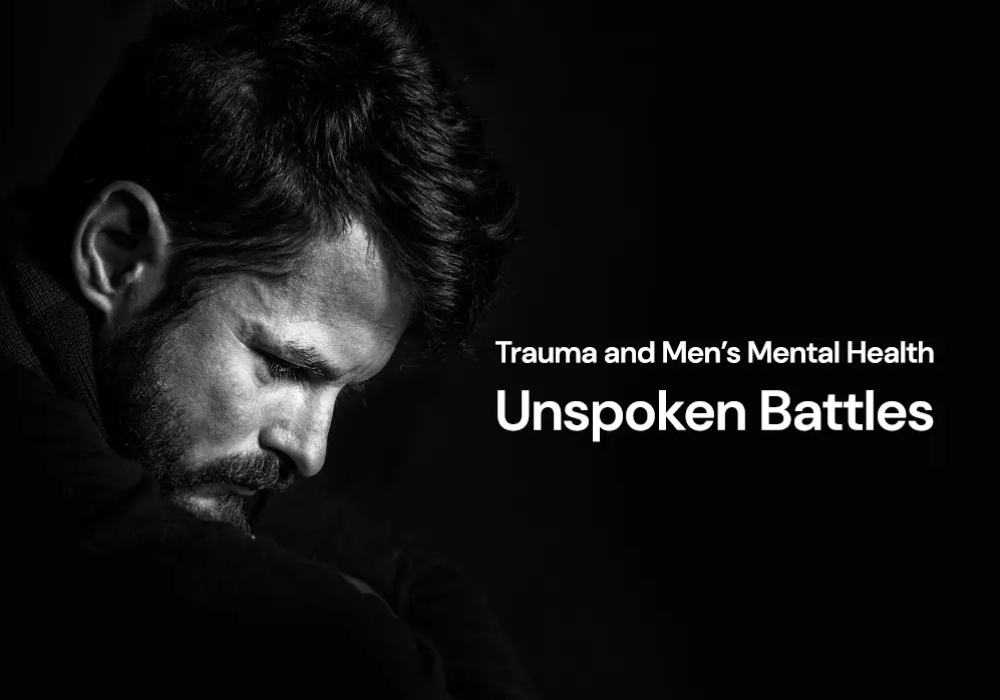
Many men experience the long-term effects of childhood trauma without recognizing it. Societal norms, cultural expectations, and personal beliefs often prevent them from acknowledging their experiences or seeking help. This lack of awareness can significantly impact their mental health, relationships, and overall well-being.
Here are some reasons why men may overlook their childhood trauma and how it affects their mental health
- Societal Expectations: Men are often expected to be strong, self-reliant, and emotionally reserved. This conditioning discourages vulnerability, leading them to suppress the pain and emotions associated with traumatic experiences. As a result, they may not recognize the emotional wounds they carry.
- Minimization of Experiences: There is a tendency among men to downplay or dismiss their past traumas, attributing their struggles to unrelated factors. This minimization stems from the belief that they should remain resilient and unaffected, preventing them from addressing the root causes of their challenges.
- Misinterpreting Symptoms: Men may not link their current difficulties—such as anger, substance abuse, or relationship struggles—with unresolved trauma. These behaviors are often seen as responses to stress or external pressure, rather than manifestations of deeper emotional wounds.
- Lack of Awareness: A limited understanding of trauma and its long-term effects further hinders recognition. Without knowledge of the various forms of trauma and how they shape mental health, men may fail to identify their own experiences as traumatic.
- Stigma and Shame: The stigma surrounding mental health, especially for men, creates a barrier to seeking help. Fear of being judged or seen as weak discourages many from addressing their past and prioritizing their well-being.
Strategies for Healing
Recognizing and addressing childhood trauma is vital for improving mental health. Here are some steps men can take on their healing journey:
- Engage in Self-Care: Self-care is fundamental to recovery. Activities such as regular exercise, meditation, journaling, and spending time in nature can foster physical, mental, and emotional well-being. Developing self-compassion and self-acceptance through these practices is key to healing.
- Build Healthy Relationships: Surrounding oneself with supportive and understanding individuals is crucial. Healthy relationships provide a safe space to share experiences and process emotions. Developing effective communication skills and setting boundaries can create a nurturing environment for growth.
- Challenge Negative Beliefs: Trauma often leads to harmful self-perceptions, such as feeling unworthy or unlovable. Identifying and reframing these negative beliefs is essential. Replacing them with positive affirmations and evidence of self-worth can help rebuild self-esteem.
- Practice Emotional Regulation: Trauma can result in overwhelming emotions like anxiety, anger, or sadness. Techniques like deep breathing, mindfulness, and grounding exercises can help manage these feelings. Engaging in creative outlets like art or music can also provide healthy ways to express emotions.
- Embrace Forgiveness and Letting Go: Forgiveness, whether directed at oneself or others, is a powerful tool for healing. Letting go of anger and resentment allows for personal growth and creates space for positive change. It is important to remember that forgiveness does not condone harmful actions but helps free the individual from their emotional burden.
Conclusion
The journey of healing from trauma is both challenging and transformative. By acknowledging the impact of past experiences and taking proactive steps toward recovery, men can gradually reclaim their mental health and build a more fulfilling life. Healing requires time, patience, and self-compassion, but every step forward brings greater resilience and wholeness.
Reference
https://learn.mapmygenome.in/blog/why-men-need-to-talk-about-their-mental-health
https://trionybehavioralhealth.com/mens-mental-health/how-trauma-affects-mens-mental-health/

Agan Health is a psychological wellness and mental healthcare centre functioning to help children, adults, women, and the elderly suffering from psychological conditions like anxiety, depression, stress, ADHD and others to break their mental shackles and reinstate them into society.
Counselling
Contact Us
For appointment and consultation:
Bengaluru
BDA complex, 717/1, 16th Main, 6th B Cross Rd, above Child Central Clinic, 3rd Block, Koramangala, Bengaluru, Karnataka 560034
Trichy
#9-A, EVR Road, Aruna Nagar, Puthur, Tiruchirappalli, Tamil Nadu 620017
